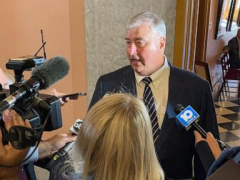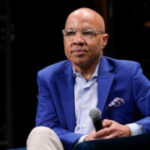COLUMBUS, Ohio — Five years after a $60 million bribery scheme funded by FirstEnergy Corp. came to light in Ohio, expert observers say the resulting prosecutions, lawsuits, penalties and legislation haven’t led to enough change and accountability to prevent politicians and corporate executives from cutting similar deals in the future.
The scheme — whose prospective $2 billion-plus pricetag to consumers makes it the largest infrastructure scandal in U.S. history — surfaced with the stunning arrests of a powerful Republican state lawmaker and four associates on July 21, 2020.
That lawmaker, former House Speaker Larry Householder, is serving 20 years in federal prison for masterminding the racketeering operation at the center of the scandal.
Jurors agreed with prosecutors that money that changed hands wasn’t everyday political giving, but an elaborate secret scheme orchestrated by Householder to elect political allies, become the House speaker, pass a $1 billion nuclear bailout law in House Bill 6 and crush a repeal effort. One of the dark money groups Householder used also pleaded guilty to racketeering.
Householder and a former lobbyist have unsuccessfully challenged their convictions. Two of the arrested associates pleaded guilty, and the other died by suicide.
Any hope that the convictions would have clarified federal law around 501(c)4 nonprofit “dark money” groups or prompted new restrictions on those hasn’t materialized, said former U.S. Attorney David DeVillers, who led the initial investigation.
“I think it’s actually worse than it was before,” he said. “Nationally, you have both Democrats and Republicans using these, so there’s no political will to do anything about it.”
Indeed, a study released in May by the Brennan Center for Justice found that dark money unleashed by the 2010 Citizens United decision hit a record high of $1.9 billion in 2024 federal races, nearly double the $1 billion spent in 2020. The vast majority of money from undisclosed donors raised into dark money accounts now goes to super PACs, providing them a way to skirt a requirement that they make their donors public, the study found.
DeVillers said one positive result of the scandal is that Ohio lawmakers appear genuinely concerned about avoiding quid pro quos, real or perceived, between them and their political contributors.
Anti-corruption legislation perennially introduced by Ohio Democrats since the scandal broke has gone nowhere in the GOP-dominated Legislature. Republican legislative leaders have said it is outside their authority to amend federal campaign finance law.
The U.S. Attorney’s office declined to discuss the investigation because prosecutions remain ongoing. Two fired FirstEnergy executives have pleaded not guilty on related state and federal charges and await trial.
Former Public Utilities Commission of Ohio Chairman Samuel Randazzo, to whom FirstEnergy admitted giving a $4.3 million bribe in exchange for regulatory favors, had faced both federal and state charges. He died by suicide after pleading not guilty.
Akron-based FirstEnergy — a $23 billion Fortune 500 company with 6 million customers in five states — admitted using dark money groups to bankroll Householder’s ascendance in exchange for passage of the bailout bill. It agreed to pay $230 million and meet other conditions to avoid prosecution, and faced other sanctions, including a $100 million civil penalty by the U.S. Securities and Exchange Commission.
But FirstEnergy hasn’t yet faced consequences from the state regulator.
“They never actually got penalized by regulators at the PUCO level,” said Ohio Consumers’ Counsel Maureen Willis, the lawyer for Ohio u





